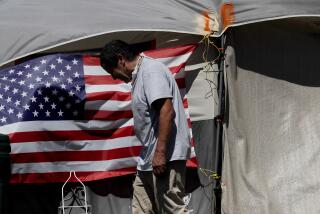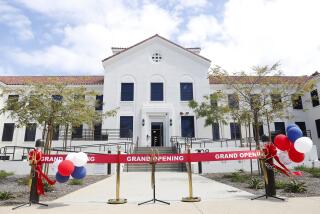Soldiers, Families Sue Over Atomic Exposure : Courts: Class-action lawsuit seeks compensation, saying that VA’s rules for benefits pose too great a hardship.
WASHINGTON — Led by a tenacious Orange County widow of a World War II veteran, ex-soldiers and families of veterans exposed to nuclear radiation filed a class-action lawsuit Wednesday, seeking compensation from the federal government for the contamination they say gave them deadly diseases.
The U.S. Department of Veterans Affairs pays benefits to those exposed to radiation during nuclear testing or in connection with the U.S. occupation of Hiroshima and Nagasaki, Japan. But veterans or survivors of those exposed to radiation from additional incidents claim that onerous VA regulations nonetheless prevent them from receiving benefits.
A spokesman for the Veterans Affairs department said he could not comment on the lawsuit because officials had not received it. However, spokesman Ken McKinnon said the agency pays benefits “if you were there, and we have evidence you were there, and you have one of the [15] diseases” listed in VA regulations.
But an attorney for the veterans countered that “the reality is we would not be filing the lawsuit if that was the case.”
Lawrence W. Leck, the Chicago attorney who filed the lawsuit at no cost to the plaintiffs, said the VA’s list of eligible diseases does not cover all the illnesses suffered by those exposed to radiation.
Veterans with illnesses not on the list, such as diabetes and prostate cancer, must prove their exposure was the result of military duty and undergo “dose reconstruction” to determine the amount of radiation exposure, he said. Unlike veterans with other disabilities, Leck added, the burden of proof in these cases is often on the veterans or their survivors.
The lawsuit is the latest battle in an 18-year war waged by Monarch Bay resident Pat Broudy, widow of a Marine major who eventually won federal benefits, but who has nonetheless doggedly pursued compensation for others contaminated by radiation.
Broudy’s husband, Maj. Charles Broudy, was exposed to radiation three times, including 1957, when he was present at a bomb blast in the Nevada desert. He died 20 years later of lymphatic cancer. Only after she lodged numerous appeals and offered proof that her husband had been among the men ordered to stand near the blast without protective clothing, did Pat Broudy begin receiving federal benefits.
“This lawsuit . . . might get dismissed out of hand,” Broudy said. “But if so, we will just try another tack. These men are all dying . . . and now [the government] will wait for the widows to die.”
The class-action petition, filed in a federal appellate court Wednesday names 10 veterans or their widows who claim to have suffered serious illnesses or deadly diseases stemming from military duty. Another, virtually identical, lawsuit is scheduled to be filed today in a federal district court in Chicago.
The plaintiffs include:
* Gregory Maas, a 52-year-old former Air Force veteran living in Park Forest, Ill., who was assigned to Thule, Greenland, in 1968 to pick up debris from the crash of a jet carrying four thermonuclear bombs. Maas said he has undergone numerous surgeries resulting from gastrointestinal cancer. He says he was rejected for benefits because his exposure was not the result of “atmospheric testing,” and it was not on American soil.
* Dianne M. Pitts, a 79-year-old Laguna Hills resident and widow of a Navy captain who helped clean up the nuclear debris from a 1966 plane crash near Palomares, Spain. Her husband, Capt. Ray Maurer Pitts, who served in the military for more than three decades, died in 1977 of brain cancer.
Pitts charged that after numerous appeals, the VA conceded her husband’s death was “service connected,” but refused to pay benefits because that might open the floodgates for others similarly exposed. She said she is participating in the lawsuit to “help all the others who are in my plight and to have the government [publicly] acknowledge . . . what caused the death of my husband.”
More to Read
Sign up for Essential California
The most important California stories and recommendations in your inbox every morning.
You may occasionally receive promotional content from the Los Angeles Times.










